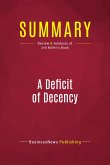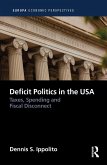The political consensus in the United States today is that the nation avoid deficit spending. But as virtuous and unassailable as that goal sounds, it has fallacies and dangers. In a lucid, nontechnical writing style, Benavie shows that deficits can be either good or bad and explains how to tell the difference. Deficits, or government borrowing, can be beneficial or harmful depending on what the government does with the money. Preventing such borrowing, Benavie points out, would be comparable to preventing one's family from borrowing money to buy a house or to put a child through college. Deficits can be beneficial to the nation's economic health in three main ways. When the economy slumps, a deficit, which is automatically created, helps to reduce the severity of the recession. When the economy is seriously depressed, boosting the deficit may be the only cure. Finally, deficits to support such investments as basic research, cleaning up toxic waste, and rebuilding inner cities are crucial to the economic health of future generations.
Bitte wählen Sie Ihr Anliegen aus.
Rechnungen
Retourenschein anfordern
Bestellstatus
Storno








